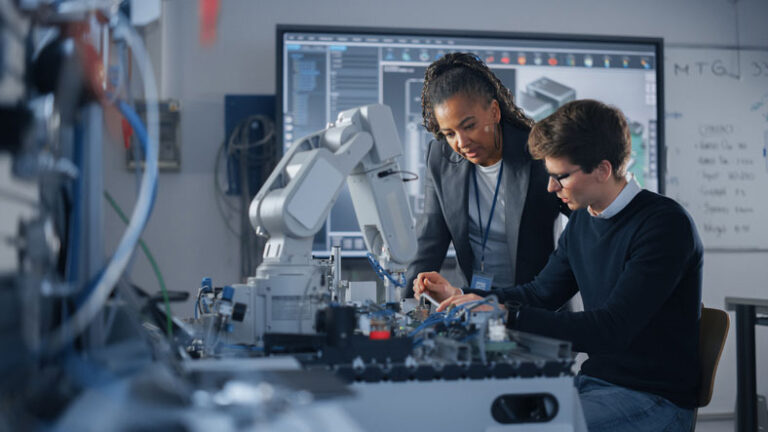Written by Scott Wilson

Bottom line – if you plan to have an impact in the emerging field of artificial intelligence, you need an advanced degree. That means a master’s program is the lowest bar to clear to meet that high standard.
Approaching the limits of computational and programming skill to bring machines to the brink of human-like reasoning and problem-solving takes discipline, dedication, and education.
It’s little surprise that the 2022 Data Science & AI Professional Salary Report from tech consultancy Burtch Works showed 93% of professionals in the field holding an advanced degree.
Not all those degrees are in artificial intelligence. Until very recently, finding an AI master’s program was as rare as finding an AI chatbot that could pass the Turing Test.





But not anymore. As demand increases and the state-of-the-art marches forward, more and more universities are putting together top-flight master’s degrees in artificial intelligence. They may be the key to unlocking new levels of capability in AI—and new levels of opportunity in your AI career.
A Master’s in Artificial Intelligence Puts You at the Cutting Edge of Studies in Earth-Shaking Technical Innovation
Most of the professionals currently working in the field of AI have had to get there through a kind of mash-up of different fields. They may have built their skills through degree programs in fields like:
- Mathematics
- Statistics
- Data Science
- Computer Science
- Electrical Engineering
None of those comes with the complete toolset needed by AI engineers and scientists, though. At every step, they’ve needed to develop interdisciplinary skillsets that cross the boundaries of conventional professional fields in order to blend the logical, analytical, and programming skills that AI work demands
A master’s degree in AI does the heavy lifting of putting all those required subjects in one place. Taking about two years, on average, to complete, these programs bring together diverse foundational coursework and blend it with a helping of original research to give you a complete education in advanced AI skills.
Evaluating the Different Types of Artificial Intelligence Master’s Degrees and Finding the Best Fit for Your Career Goals
 As you can guess from looking at the headlines these days, those skills are strongly in demand across a spectrum of industries and employers. AI master’s programs are going to be the go-to source for professionals to fill those jobs in the coming decades.
As you can guess from looking at the headlines these days, those skills are strongly in demand across a spectrum of industries and employers. AI master’s programs are going to be the go-to source for professionals to fill those jobs in the coming decades.
Although it’s a field that is still finding its feet, you can already see that both jobs and educational programs are beginning to filter out into about three different tracks:
1. Computer science-heavy roles that focus on fundamental research and groundbreaking new developments in AI capabilities.
These are the professionals behind the scenes who will build and advance AI technology.
2. Business-centric positions that offer practical engineering solutions to solve the real-world needs of businesses, governments, and consumers.
These are the professionals who will use AI tools and concepts to help make business and government more efficient.
3. Highly developed technical roles in specific professional fields that have emergent applications for AI in sensitive areas.
These are the professionals in roles ranging from medical diagnostics to engineering who will use AI tools and concepts to optimize efficiency and accuracy in their field.
Understanding the landscape for AI master’s degrees requires looking at your options down the stretch of that three-lane highway. You’ll want to pick the right program for your career goals.
Almost all AI master’s degrees require around 30 credits of study and take a year or two to complete. Each comes with a slightly different educational focus, research opportunities, and unique courses.
In some cases, entire master’s programs are aligned to one of these tracks. In others, you may find that one program comes with a variety of concentrations that can lead you along your choice of different paths. And, of course, you will also find more general AI master’s programs that build on existing experience and education, allowing you to launch a future down any one of those paths.
To that end, degrees in any of these areas will share core coursework like:
- Fundamentals in Intelligent Systems Design
- Theories of Computation
- Design and Analysis of Algorithms for Machine Learning
- Deep Learning and Neural Networks
- Research Processes and Experimental Design
- Ethical AI Programming
Choosing the Right Bachelor’s Degree Program to Maximize Your MSAI Experience
 Considering the rigorous demands of a master’s degree in artificial intelligence, the admissions requirements for these programs can be strict. You’ll almost always need to have a strong grounding in essential mathematics and statistical sciences before you can even think about applying. Programming experience and some familiarity with data structures is strongly encouraged.
Considering the rigorous demands of a master’s degree in artificial intelligence, the admissions requirements for these programs can be strict. You’ll almost always need to have a strong grounding in essential mathematics and statistical sciences before you can even think about applying. Programming experience and some familiarity with data structures is strongly encouraged.
These are all skills you are expected to develop as part of your undergraduate studies. While there are an increasing number of bachelor’s degrees in artificial intelligence or machine learning available, many MSAI students will choose to prepare with degrees in majors like:
- Mathematics
- Physics
- Computer Science
- Data Science
All of them have pluses and minuses as a foundation for your AI master’s studies. But they also come with opportunities to focus your interests even before you start in at the graduate level.
For example, an undergrad emphasis in programming can mean you need to spend less time or can begin at a more advanced level when you start your master’s. A background in robotics or medicine can set you up for better technical integration at the graduate level in those specialized industries.
Finally, every AI master’s degree will be capped off by a final project. Traditionally, master’s programs require a thesis paper: a lengthy, independent, original course of research and investigation resulting in around 100 pages of formal academic writing detailing your results and conclusions.
Most programs in the field today, however, are either leaning toward a capstone project requirement or allowing you to select from between the two. A capstone also involves research and writing a paper, but the research requirements are often lowered in favor of developing more practical ideas and exploring them. Capstones are also sometimes group projects, shared between grad students for final credit.
Either way, it’s a signifier of your progress as a graduate student and a demonstration of your knowledge and skills. Employers in any area are sure to review your final project as part of their evaluation before hiring.
1. Artificial Intelligence Master’s Programs Designed for Computer Science and Research Professionals

The standard Master of Science in Artificial Intelligence is most likely to fall into this category without any special focus or concentration. These degrees teach the purest intellectual roots in modern artificial intelligence. They rely strongly on basic math and statistical skills to dive into advanced subjects like:
That means a lot of coursework that is heavy in subjects like:
- Deep Learning and Neural Network Design
- Algorithm Design and Optimization
- Linear and Integer Programming
- Experimental Design and Testing
- Probability and Chaotic Dynamics
Most of these fall into the realm of basic research. Practical applications will also be covered, but with less emphasis than exploring theoretical boundaries and the state-of-the-art in AI research. In fact, there are even dedicated Master of Research in Artificial Intelligence programs.
Similarly, your thesis or capstone project will be expected to push the limits of current understanding and capabilities in machine thinking. In fact, a thesis requirement may be more common in these programs than the more practical approaches of a final capstone requirement.
Many of these programs are also found as Master of Computer Science, Artificial Intelligence Emphasis, or under titles like Master of Science in Intelligent Systems.
And there are sometimes concentrations in standard MSAI degrees that are clearly aimed at the compsci core:
- Algorithms, Network, and Optimization
- Numerical Computation
- Intelligent Systems
- Deep Learning
2. AI Master’s Degrees for Business-Focused Artificial Intelligence Roles

Business-oriented AI master’s degrees are often those offered by engineering departments, like a Master of Science in AI Engineering, or a Master of Engineering in Artificial Intelligence. They take the same core principles of AI education as compsci programs and round them out with additional coursework in areas like:
- Finance
- Healthcare
- Human Resources
- Business Ventures
There are also degrees that are available in different majors entirely but focus on AI as a business or applied technology. Those can include a Master of Science in Business Analytics, AI in Business Track, or a Master of Science in Business Intelligence and Data Analytics with an AI Graduate Certificate. They offer greater emphasis on the management and oversight of AI projects. But that may be a good fit for you, particularly if your undergraduate background has already given you strong math and programming skills.
3. Artificial Intelligence Master’s Programs for Applied Use in Highly Technical Professions

These AI master’s degree programs are some of the easiest to spot at the schools offering them. They often have a very clear title that lines right up with the professional role in question, as with a Master of Science of Engineering in Robotics with a specialization in AI and Machine Learning. In other cases, they may come as a concentration option on a more general degree, as with a Master of Science in Applied Artificial Intelligence, Biomedical Engineering concentration or a Master of Science in Artificial Intelligence specialization in Connected Vehicles.
Quite a few programs that lean in this direction are engineering degrees; in some cases, you’ll find programs at a single university offered as either a Master of Engineering or a Master of Science… the MEng in Artificial Intelligence will almost always be the option with the more specific technical focus.
These fields are also covered as concentrations in AI tacked on to majors in the profession itself. A Master of Science in Cybersecurity with an Emphasis in Artificial Intelligence, or a Master of Science in Robotics and Autonomous Systems AI concentration clearly focus your AI studies on the major field of study.
Even more than in business-oriented AI master’s, these programs come with classes that cover a lot of ground outside of AI and ML theory. You can expect to absorb almost as much technical detail about the professional focus area as you do about AI in general.
Diverse Electives Round Out Your Master’s in AI Curriculum
AI is already a field with broad applications. Master’s degree candidates are pushing out into new areas all the time. So, a wide range of electives have sprung up to help you tailor your studies toward your interests and career plans.
Some of these work to deepen your knowledge in specific AI techniques and systems:
- Intelligent Agents and Decision Making Analytics
- Probabilistic Models of Human and Machine Learning
- Applied Statistics in R
- Fundamental Concepts of Programming Languages
- Numerical Methods of Optimization
- Theoretical Foundations of Autonomous Systems
Others are aimed at particular applications:
- Data Mining
- Natural Language Processing
- Computer Vision
- Modern Offense and Defense in Cybersecurity
- Applied Medical Informatics
By putting them together in the right combination with your core and concentration coursework, you can tailor your AI master’s program to take you on any career path you choose.
Finding the Right University for Your Master’s in Artificial Intelligence
 It’s no mystery what schools are turning out the best graduates in AI today. Check the diplomas hanging on the walls at the hot startups and big tech company players in AI, and you’ll find the same universities named over and over.
It’s no mystery what schools are turning out the best graduates in AI today. Check the diplomas hanging on the walls at the hot startups and big tech company players in AI, and you’ll find the same universities named over and over.
But if you’re currently evaluating your options for a master’s in AI and ML, you’re facing a slightly different question.
You don’t just want the best college in the country for advanced AI studies; you want the school with the AI program that has the best fit for your individual career goals.
That is going to start with the career path you envision. Clearly, you need to pick a degree program that lines you up cleanly with whichever of the three tracks that most resonates with your vision. Not every university caters to every possibility.
Beyond that, though, you will end up checking many of the same factors no matter what kind of program you are considering. That will include things like:
Obscene Amounts of R&D Funding
There is a shocking amount of money sloshing around in AI and ML research today. It’s even more shocking if you manage to end up at a school that hasn’t somehow managed to tap into that flow of dollars. So, you will want to make sure your pick is a program that has jaw-dropping funding for research.
Professors With Experience and Deep Expertise in AI Plus Strong Teaching Talent
What you are learning almost always takes second place to who you are learning it from. So, in addition to checking the industry credentials and publication history of instructors, you will also want to know they have real academic abilities. You need advisors you can connect with, teachers who explain hard concepts in ways that make them transparent.
Extensive Resources for Students and Research Projects
Following directly along the money trail, you also want to know that funding is going toward resources you can tap into and take advantage of. Well-staffed academic advising departments, counseling and writing centers, and voluminous libraries stocked with the latest journals and publications are all supports you will need. Clearly, well-equipped computer labs and cloud computing resources with stacks of processor time to take advantage of are also a must for AI grad students.
Strong Ties to Relevant Industries
Given the different types of destinations for AI master’s degree graduates, it’s important not just to find a school with strong ties in the corporate world, but one with strong connections in the industries you are interested in. If you are looking for a computer science-focused role in advanced AI R&D, for instance, it makes little sense to place your bet on a university with deep connections to medical technology suppliers.
Looking at Online Master’s in Artificial Intelligence Degrees for the Ultimate in Flexibility
 You can find all these qualities and more in many online AI degree programs today.
You can find all these qualities and more in many online AI degree programs today.
Computer science in general has been an early adopter in online learning. It’s a perfect fit for AI studies, where most of the heavy lifting of computation happens in the cloud anyway.
Among all online master’s, artificial intelligence programs are some of the best suited to the format.
And with fully or partly remote studies come plenty of other benefits:
- You can pick from among AI degree programs today all over the country, rather than the limited options that may be available closer to home
- Online studies are usually flexible in terms of schedule and attendance, leaving you available to keep up with your current career and family obligations
- The ability to stay home and study without relocating can save a bundle in costs over the long run
What Are the Typical Costs for Artificial Intelligence Master’s Programs?
 Any kind of advanced education in America today doesn’t come cheap. AI master’s programs are no exception. While you can make excellent money in an industry that is taking off like wildfire, you’ll have to make an investment in order to get there.
Any kind of advanced education in America today doesn’t come cheap. AI master’s programs are no exception. While you can make excellent money in an industry that is taking off like wildfire, you’ll have to make an investment in order to get there.
What kind of money are we talking? According to the National Center for Education Statistics (NCES), the average annual cost in tuition and fees for graduate students in 2022 was $20,513. That’s just your baseline—housing, learning materials, and the rest all come on top of that.
Depending on the type of university you choose, you can be looking at even higher rates. Some of the best AI programs in the country are offered at private schools. NCES found the average at private universities in 2022 came to $28,017 per year, which could push your total tuition costs up to $60,000 or more for a full master’s degree.
On the other hand, you can cut your costs substantially if you have access to a suitable in-state program. Those came with a yearly price tag of only $12,596 in 2022.
The reality is that most students can put together some combination of grants, loans, and family resources to realize their dreams in AI. With a graduate degree, not only can you build your own ideal career on the frontier of artificial intelligence, but you can work toward realizing a vision for society that is shared by millions around the world.






